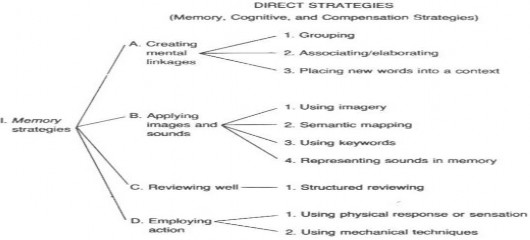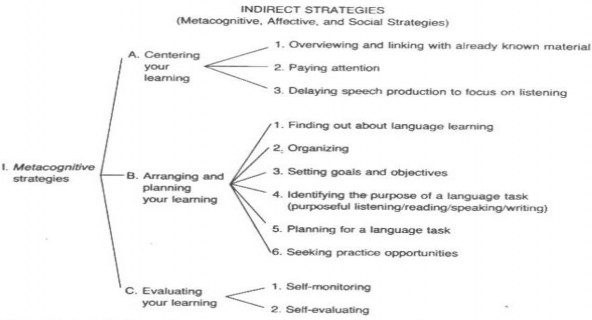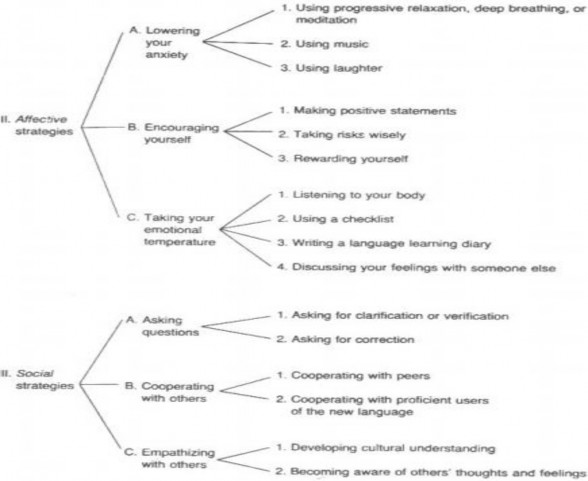APPENDIX 2: DIAGRAM OF THE STRATEGY SYSTEM SHOWING ALL THE STRATEGIES

(Source: Oxford, 1990, pp.18-19)
DIAGRAM OF THE STRATEGY SYSTEM SHOWING ALL THE STRATEGIES (CONTINUED)


(Source: Oxford, 1990, pp.20-21)
APPENDIX 3: QUESTIONNAIRE ON LANGUAGE LEARNING STRATEGIES
(Strategy Inventory for Language Learning – SILL)
This questionnaire aims to identify the language learning strategies you use and how often you use these strategies. The statements in this questionnaire describe possible language learning strategies. Please read each statement and indicate the degree to which you agree or disagree. Use a checkmark (√) for the following scales to stand for the frequency of using that strategy
1= never or almost never true of me 2= generally not true of me
3= somewhat true of me 4= generally true of me
5= always or almost always true of me
STRATEGIES | Never true 1 | Generally not true 2 | Somewhat true 3 | Generally true 4 | Always true 5 | |
1 | I think of the reasons I learn English. | |||||
2 | I read and write new English words every day to remember them easily. | |||||
3 | I try to read English words anywhere I see. | |||||
4 | I remember a new English word by reading and writing in papers many times. | |||||
5 | I also try to remember new words through singing along with English songs. | |||||
6 | I also learn new words through reading Newspapers, Magazines, and English story books. | |||||
7 | I often review my English lessons. | |||||
8 | I learn new English words/ phrases by remembering my class activities and reading them out loud. | |||||
9 | I sometimes read and write several English sentences. |
Có thể bạn quan tâm!
-
 The use of language learning strategies in English reading at Doan Ket secondary school - An investigation - 13
The use of language learning strategies in English reading at Doan Ket secondary school - An investigation - 13 -
 The use of language learning strategies in English reading at Doan Ket secondary school - An investigation - 14
The use of language learning strategies in English reading at Doan Ket secondary school - An investigation - 14 -
 The use of language learning strategies in English reading at Doan Ket secondary school - An investigation - 15
The use of language learning strategies in English reading at Doan Ket secondary school - An investigation - 15 -
 The use of language learning strategies in English reading at Doan Ket secondary school - An investigation - 17
The use of language learning strategies in English reading at Doan Ket secondary school - An investigation - 17
Xem toàn bộ 140 trang tài liệu này.
STRATEGIES | Never true 1 | Generally not true 2 | Somewhat true 3 | Generally true 4 | Always true 5 | |
10 | I try to read English fluently. | |||||
11 | I only use the English words I know. | |||||
12 | I sometimes read English stories with my classmates in class. | |||||
13 | I write notes, messages and jokes in English and read them again. | |||||
14 | I try to imitate patterns in English after reading a material. | |||||
15 | I try to translate the reading passages. | |||||
16 | I read English without looking up every new word. | |||||
17 | I pay attention when my teachers/ friends are reading English. | |||||
18 | I have clear aims to improve my reading skill. | |||||
19 | I plan my timetable to have enough time for English learning. | |||||
20 | I am nervous when I am doing a reading and writing test in English. | |||||
21 | I write down my feelings in a personal diary after reading a text. | |||||
22 | If I don’t understand something in English, I look up the dictionary and repeat it after the phonetics and meaning. | |||||
23 | I read the important grammar points on the internet to correct my mistakes. | |||||
24 | I often practice English by reading a lot of things. | |||||
25 | I ask questions in English in class. | |||||
26 | I sometimes read about the culture of English speakers. |
(Adapted from Oxford, 1990)
QUESTIONNAIRE ON LLS IN VIETNAMESE
PHIẾU KHẢO SÁT VỀ CHIẾN LƯỢC HỌC TIẾNG ANH
Các em Học sinh thân mến!
Hiện nay, chúng tôi đang nghiên cứu đề tài về Chiến lược học Tiếng Anh của học sinh trường THCS Đoàn Kết nhằm phục vụ tốt hơn cho việc dạy và học trong thời gian tới. Mong các em dành chút ít thời gian đọc từng câu trong Bảng câu hỏi dưới đây, và cho biết mức độ đồng ý hoặc không đồng ý của các em về các chiến lược học đó bằng cách đánh dấu (√) vào câu mà mình chọn theo cấp độ như sau:
1 = Không bao giờ hoặc gần như không bao giờ đúng đối với tôi 2 = Nói chung không đúng đối với tôi
3 = Hơi đúng đối với tôi
4 = Nói chung đúng đối với tôi
5 = Luôn luôn hoặc gần như luôn luôn đúng đối với tôi
I. THÔNG TIN CÁ NHÂN
Họ và tên: …………………………………… Nam/Nữ: … Ngày sinh: ………… Lớp: 6/…
II. CÂU HỎI KHẢO SÁT (đánh dấu √ vào câu mà mình chọn)
CHIẾN LƯỢC HỌC | Không bao giờ đúng 1 | Nói chung không đúng 2 | Hơi đúng 3 | Nói chung đúng 4 | Luôn luôn đúng 5 | |
1 | Tôi nghĩ về các lý do tôi học tiếng Anh. | |||||
2 | Đọc và viết từ vựng tiếng Anh giúp tôi dễ nhớ từ. | |||||
3 | Tôi cố gắng đọc từ tiếng Anh ở bất cứ nơi nào tôi nhìn thấy. | |||||
4 | Tôi ghi nhớ từ vựng mới bằng cách đọc và viết ra giấy nhiều lần. | |||||
5 | Tôi cố gắng ghi nhớ từ mới qua lời các bài hát tiếng Anh. | |||||
6 | Tôi học từ mới thông qua việc đọc Báo, Tạp chí, và sách truyện viết bằng tiếng Anh. | |||||
7 | Tôi thường ôn lại bài học tiếng Anh của mình. |
CHIẾN LƯỢC HỌC | Không bao giờ đúng 1 | Nói chung không đúng 2 | Hơi đúng 3 | Nói chung đúng 4 | Luôn luôn đúng 5 | |
8 | Tôi thuộc từ/câu bằng cách nhớ lại các hoạt động trong lớp học và đọc chúng to lên. | |||||
9 | Tôi thỉnh thoảng tự đọc và viết một số câu bằng tiếng Anh. | |||||
10 | Tôi cố gắng đọc tiếng Anh cho lưu loát. | |||||
11 | Tôi chỉ sử dụng những từ tiếng Anh mà tôi biết. | |||||
12 | Tôi đôi khi đọc truyện bằng tiếng Anh với bạn bè trong lớp. | |||||
13 | Tôi ghi chú lại các hoạt động, những lời đùa bằng tiếng Anh rồi sau đó đọc lại chúng. | |||||
14 | Tôi cố gắng làm theo những mẫu câu tiếng Anh sau khi được đọc qua. | |||||
15 | Tôi cố gắng phiên dịch bài đọc sang nghĩa tiếng Việt. | |||||
16 | Tôi đọc Tiếng Anh không tra cứu nghĩa của từng từ mới. | |||||
17 | Tôi rất chú ý lúc thầy cô/bạn bè tôi đọc tiếng Anh. | |||||
18 | Tôi có mục tiêu cải thiện kỹ năng đọc cho mình. | |||||
19 | Tôi sắp xếp thời gian để học tiếng Anh. | |||||
20 | Tôi lo lắng mỗi khi làm bài kiểm tra đọc viết tiếng Anh. | |||||
21 | Tôi viết lại cảm nghĩ của mình vào nhật ký sau khi đọc qua một bài đọc nào đó. | |||||
22 | Nếu chưa hiểu nghĩa của một từ nào đó trong tiếng Anh, tôi tra từ điển, nghe phát âm và đọc lại từ đó nhiều lần. | |||||
23 | Tôi đọc qua các điểm ngữ pháp quan trọng trên mạng Internet để sửa lỗi cho mình. | |||||
24 | Tôi thường thực hành tiếng Anh bằng cách đọc nhiều thứ. | |||||
25 | Tôi hỏi các câu hỏi bằng tiếng Anh khi học ở lớp. | |||||
26 | Tôi thỉnh thoảng đọc hiểu về văn hóa của những người nói tiếng Anh. |
Chúng tôi cam đoan rằng Phiếu khảo sát này không làm ảnh hưởng gì đến các em. Chân thành cảm ơn các em đã tham gia cuộc khảo sát này!
APPENDIX 4: THE QUESTIONS FOR INTERVIEWS
QUESTIONS | REMARKS | |
1 | What English skill of all do you like best? Why? | The questions are the sentences related to the learning strategies taken from the surveyed questionnaires |
2 | How is your reading ability? (or What do you think about Reading skill?) | |
3 | Why do (not) you use this learning strategy (sentences 7, 10 or 12, 25)? | |
4 | How many times do you read the words to remember them? | |
5 | When reading English words, do you read alone or with your friends? | |
6 | How do you feel about this learning strategy? | |
7 | The learning strategies (sentences 2 or 4) are good for your English learning, why don’t you use them? / or Why don’t you read a lot? (to the poor-grade group) | |
8 | After this interview, which learning strategy will you apply? |
APPENDIX 5: FOCUS INTERVIEWS IN DETAILS
(Interviewing good-grade and poor-grade groups)
ANSWERS | ||
GOOD-GRADE GROUP | POOR-GRADE GROUP | |
1. What English skill of all do you like best? Why? | Student 1: I like reading and Speaking because reading is good. | Student 1: I only like speaking. |
Student 2: I like reading too, because I have read English stories a lot. | Student 2: I like reading. | |
Student 3: I like reading because it has helped me understand the lesson contents | Student 3: (no answer) | |
2. What do you think about Reading skill? | Student 1: I think it’s important. | Student 1: I don’t read, I like speaking to foreigners. |
Student 2: Reading helps me improve my knowledge. | Student 2: Reading helps me know something new in the world. | |
Student 3: I think it’s important to read a lot. | Student 3: It’s good to read, but I don’t read English. | |
3. Why do (not) you use this learning strategy (sentences 7, 10 or 12, 25)? | Student 1: Because it helps me improve my reading and other skills. | Student 1: I don’t care English subject. |
Student 2: Because it helps me understand the story’s content. | Student 2: I am not good at English, I just like music. | |
Student 3: Because it helps me remember my lessons. | Student 3: I don’t know. | |
4. How many times do you read the words to remember them? | Student 1: I read words many times. | Student 1: I sometimes read words. |
Student 2: I usually read the words and read stories. | Student 2: I read the vocabulary and reading texts in my lessons. | |
Student 3: I read and write the words many times in the papers to remember them. | Student 3: I seldom read the words. | |
5. When reading English words, do you read alone or with your friends? | Student 1: I read alone and sometimes read with my friends. | Student 1: I read English words chorally in my class. |
Student 2: I read alone | Student 2: I read English words in my class | |
Student 3: I read English words in my class with friends | Student 3: Yes, read chorally. | |
6. How do you feel about this learning strategy? | Student 1, 2, 3: It is good for me (the same answer) | Student 1, 2, 3: Yes, it is good (the same answer) |
7. Why don’t you use the such learning strategies 2, 4? or Why don’t you read a lot? | Student 1: I don’t have time to read, I am busy. | |
Student 2: I learn other subjects and do the housework. | ||
Student 3: I am lazy. | ||
8. After this interview, which learning strategy will you apply? | Student 1, 2, 3: Reading strategy (the same answer) | Student 1, 2, 3: Reading strategy (the same answer) |




